 Pregnancy is an exciting time in a woman’s life — but it can also generate a lot of questions about both the mother’s and the baby’s health. The realm of dental care is no exception.
Pregnancy is an exciting time in a woman’s life — but it can also generate a lot of questions about both the mother’s and the baby’s health. The realm of dental care is no exception.
Here are a few of the questions we frequently hear from expectant mothers, along with our answers.
Does the baby’s tooth calcium come from my teeth?
This question is frequently asked by mothers who may have had dental issues and are worried they’ll pass on these problems to their baby. Simply put, no — a baby developing in the womb derives minerals like calcium for their teeth and bones from the mother’s diet, not her teeth. What an expectant mother can do is be sure to eat a healthy, balanced diet rich in nutrients and minerals like calcium.
Am I at heightened risk for dental disease during pregnancy?
Pregnancy does cause significant increases in your body’s hormones, particularly estrogen. This can cause changes in the gum tissue’s blood vessels that may make you more susceptible to periodontal (gum) disease (commonly called “pregnancy gingivitis”). It’s also possible later in pregnancy to develop non-cancerous overgrowths of gum tissues called “pregnancy tumors.” The heightened risk for gum disease during pregnancy calls for increased vigilance in monitoring gum health.
What should I do to take care of my teeth?
It’s important to brush your teeth thoroughly twice a day with ADA-approved fluoridated toothpaste to remove plaque, a thin layer of bacteria and food remnants that adhere to teeth. You should also floss daily and consider using an anti-plaque/anti-gingivitis mouthrinse. And, of course, you should see us for regular office cleanings and checkups, or if you notice swollen, tender or bleeding gums, or other abnormalities.
Should I take prenatal fluoride supplements?
This sounds appealing as a way to give your baby a head start on strong tooth development. Studies on its effectiveness, however, remain slim and somewhat inconclusive — we simply don’t have enough data to make a recommendation. What does have a solid research record is the application of fluoride to teeth in young children just after they appear in the mouth — studies involving over a thousand teeth have shown 99% cavity-free results using topical fluoride applications with sealants.
If you would like more information on dental care during pregnancy, please contact Dr. Cindy Sumarauw at 801-281-3500 to schedule an appointment for a consultation. You can also learn more about this topic by reading the Dear Doctor magazine article “Expectant Mothers.”

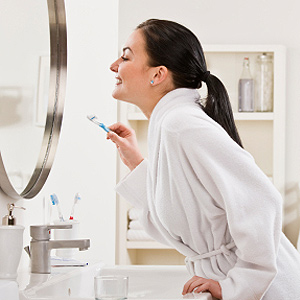 We all experience the occasional bout of bad breath from dry mouth or after eating certain foods. Chronic halitosis, on the other hand, could have an underlying health cause like periodontal (gum) disease, sinus infections or even systemic illnesses like diabetes. Anyone with persistent halitosis should undergo a thorough examination to determine the root cause.
We all experience the occasional bout of bad breath from dry mouth or after eating certain foods. Chronic halitosis, on the other hand, could have an underlying health cause like periodontal (gum) disease, sinus infections or even systemic illnesses like diabetes. Anyone with persistent halitosis should undergo a thorough examination to determine the root cause. We now have an amazing repertoire in dentistry to restore the look and function of damaged or missing teeth. From tooth-colored crowns to life-like dental implants, we can turn an embarrassing smile into one you’re confident to show the world.
We now have an amazing repertoire in dentistry to restore the look and function of damaged or missing teeth. From tooth-colored crowns to life-like dental implants, we can turn an embarrassing smile into one you’re confident to show the world. Did you ever brush your teeth and find that your gums were bleeding slightly? This unwelcome discovery is more common than you might think — and it might have something to tell you about your oral health. Here are five things you should know about bleeding gums.
Did you ever brush your teeth and find that your gums were bleeding slightly? This unwelcome discovery is more common than you might think — and it might have something to tell you about your oral health. Here are five things you should know about bleeding gums. Your braces have finally been removed and you’ve unveiled your new smile to the world. You’re finished with orthodontics — right?
Your braces have finally been removed and you’ve unveiled your new smile to the world. You’re finished with orthodontics — right? For years, even as tobacco use began to decline and disappear in most settings, professional baseball seemed one of the few exceptions. Now, the tide is finally turning. Recently, the legendary right-hand pitcher Curt Schilling revealed that he had been treated for oral cancer — and said that his chewing tobacco habit was to blame. “I’ll go to my grave believing that was why I got [cancer],” Schilling told the Boston Globe.
For years, even as tobacco use began to decline and disappear in most settings, professional baseball seemed one of the few exceptions. Now, the tide is finally turning. Recently, the legendary right-hand pitcher Curt Schilling revealed that he had been treated for oral cancer — and said that his chewing tobacco habit was to blame. “I’ll go to my grave believing that was why I got [cancer],” Schilling told the Boston Globe.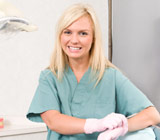 Keeping up your dental hygiene with daily brushing and flossing is essential to preventing disease and maintaining good oral health. But that doesn’t mean it’s all on your shoulders — the fact is, you have a strong partner in your dental hygienist. This valuable member of our staff provides a number of different functions that add a boost to your hygiene habits.
Keeping up your dental hygiene with daily brushing and flossing is essential to preventing disease and maintaining good oral health. But that doesn’t mean it’s all on your shoulders — the fact is, you have a strong partner in your dental hygienist. This valuable member of our staff provides a number of different functions that add a boost to your hygiene habits.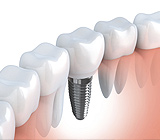 Perhaps you’ve heard a lot about dental implants, an increasingly popular tooth replacement system. Although they can be expensive (depending on the exact application) they have a number of important benefits that add value to your investment.
Perhaps you’ve heard a lot about dental implants, an increasingly popular tooth replacement system. Although they can be expensive (depending on the exact application) they have a number of important benefits that add value to your investment. Concussion in athletes is a topic that’s getting lots of attention recently — not only in professional leagues, but also at the level of high school, collegiate and amateur sports. Helmets are being increasingly used in both contact and non-contact sports, like skiing and biking. But when you’re looking for quality gear that gives you additional protection against head and facial injuries, do you think of getting it at the dental office?
Concussion in athletes is a topic that’s getting lots of attention recently — not only in professional leagues, but also at the level of high school, collegiate and amateur sports. Helmets are being increasingly used in both contact and non-contact sports, like skiing and biking. But when you’re looking for quality gear that gives you additional protection against head and facial injuries, do you think of getting it at the dental office?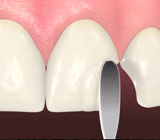 Q: What exactly is cosmetic tooth bonding?
Q: What exactly is cosmetic tooth bonding?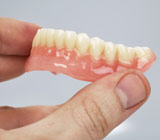 At first glance, you might think at-home denture repair belongs in the same category as Do-It-Yourself brain surgery and cloning your pet in the kitchen sink. But the fact is, you can actually buy a variety of DIY denture repair kits on line, send for them through the mail, even pick them up at some drug stores;you can even watch a youtube video on how to do your own denture repair. So if you’re feeling like Mr. (or Ms.) Fix-it, should you give it a whirl?
At first glance, you might think at-home denture repair belongs in the same category as Do-It-Yourself brain surgery and cloning your pet in the kitchen sink. But the fact is, you can actually buy a variety of DIY denture repair kits on line, send for them through the mail, even pick them up at some drug stores;you can even watch a youtube video on how to do your own denture repair. So if you’re feeling like Mr. (or Ms.) Fix-it, should you give it a whirl? What happens if you’re right in the middle of a song, in front of an arena full of fans… and you knock out a tooth with your microphone? If you’re Michael Buble, you don’t stop the show — you just keep right on singing.
What happens if you’re right in the middle of a song, in front of an arena full of fans… and you knock out a tooth with your microphone? If you’re Michael Buble, you don’t stop the show — you just keep right on singing.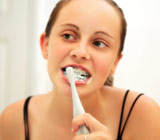 It’s a recognized goal of modern dentistry to help you keep your natural teeth clean and disease-free, so you’ll be able to enjoy them for your whole life. But dentists can’t accomplish that goal by ourselves — we need your help! Maintaining good oral hygiene is the best way to ensure that your smile stays as healthy as it should be. Here are a few simple tips that can make a big difference in your dental health.
It’s a recognized goal of modern dentistry to help you keep your natural teeth clean and disease-free, so you’ll be able to enjoy them for your whole life. But dentists can’t accomplish that goal by ourselves — we need your help! Maintaining good oral hygiene is the best way to ensure that your smile stays as healthy as it should be. Here are a few simple tips that can make a big difference in your dental health. Some train intensively for months ahead of time, so they can achieve peak performance during the season; others simply enjoy occasional pick-up games with friends. But here’s something all athletes, both amateurs and professionals, should know: Dental accidents in sports can happen at any time, and the consequences of not wearing the proper protective equipment can be serious.
Some train intensively for months ahead of time, so they can achieve peak performance during the season; others simply enjoy occasional pick-up games with friends. But here’s something all athletes, both amateurs and professionals, should know: Dental accidents in sports can happen at any time, and the consequences of not wearing the proper protective equipment can be serious.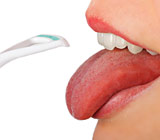 Although usually not considered a serious health condition,
Although usually not considered a serious health condition,  Thumb or finger sucking is a normal activity for babies and young children — they begin the habit while still in the womb and may continue it well into the toddler stage. Problems with tooth development and alignment could arise, however, if the habit persists for too long.
Thumb or finger sucking is a normal activity for babies and young children — they begin the habit while still in the womb and may continue it well into the toddler stage. Problems with tooth development and alignment could arise, however, if the habit persists for too long. One’s a singer who made her name playing New York clubs in the 1980’s before catapulting to international pop stardom; the other’s an actress from New Zealand who, in 1994, at the age of 11, became the second-youngest person ever to win an Academy Award. Both remain at the top of the A-list today. What other feature do Madonna and Anna Paquin have in common?
One’s a singer who made her name playing New York clubs in the 1980’s before catapulting to international pop stardom; the other’s an actress from New Zealand who, in 1994, at the age of 11, became the second-youngest person ever to win an Academy Award. Both remain at the top of the A-list today. What other feature do Madonna and Anna Paquin have in common? Traveling to faraway places is the stuff of daydreams for many people, and even more exciting when the dream comes true. But that excitement could be dampened should you ever be faced with the reality that your medical treatment options abroad can be quite different from what you enjoy at home in the United States.
Traveling to faraway places is the stuff of daydreams for many people, and even more exciting when the dream comes true. But that excitement could be dampened should you ever be faced with the reality that your medical treatment options abroad can be quite different from what you enjoy at home in the United States.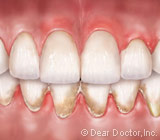 If your gums bleed when you brush your teeth, it’s unlikely the cause is brushing too hard. The more common reason (especially if you’re experiencing little to no pain) is periodontal (gum) disease caused by the accumulation of bacterial deposits known as dental plaque and calculus where your teeth and gums meet.
If your gums bleed when you brush your teeth, it’s unlikely the cause is brushing too hard. The more common reason (especially if you’re experiencing little to no pain) is periodontal (gum) disease caused by the accumulation of bacterial deposits known as dental plaque and calculus where your teeth and gums meet.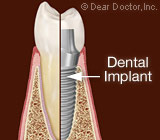 If you’re missing a tooth, you’re not alone; in fact 35 million Americans are missing all of their teeth in at least one jaw! Whether it’s one tooth or many, it’s important to replace what’s missing. Depending on the number of teeth lost, the potential drawbacks to doing nothing may become hard to ignore: impediments to eating, interference with speech, and unaesthetic appearance, for example.
If you’re missing a tooth, you’re not alone; in fact 35 million Americans are missing all of their teeth in at least one jaw! Whether it’s one tooth or many, it’s important to replace what’s missing. Depending on the number of teeth lost, the potential drawbacks to doing nothing may become hard to ignore: impediments to eating, interference with speech, and unaesthetic appearance, for example.